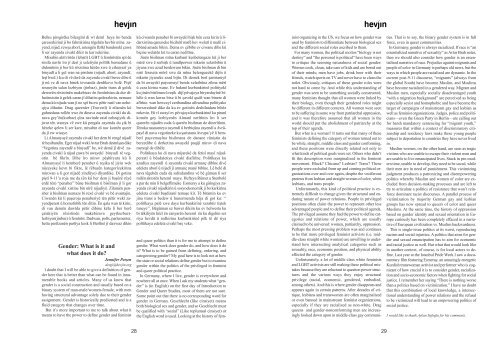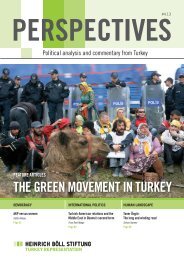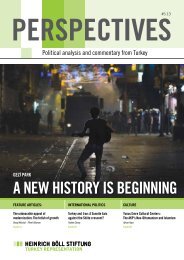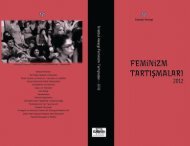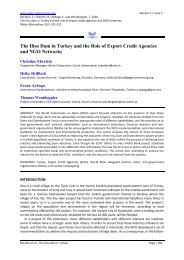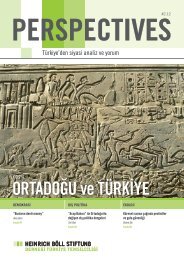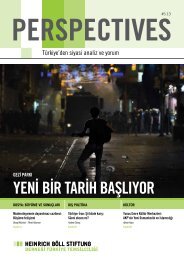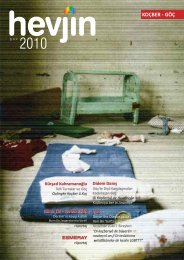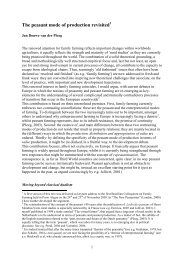PDF versiyonuna
PDF versiyonuna
PDF versiyonuna
Create successful ePaper yourself
Turn your PDF publications into a flip-book with our unique Google optimized e-Paper software.
Belku pirsgirêka bilezgînî di wî demî heya îro benda<br />
çareserkirinê ji bo fahmkirina têgehên hevbir mîna zayend,<br />
nijad, rewşa aborî, astengên fîzîkî bandorekî çawa<br />
li ser zayenda civakî dikir tu kar nekirine.<br />
Mixabin aktîvîstên (lebatî) LGBT û femînîstên spî ên<br />
sinifa navîn îro jî dest ji xeletiyên polîtîk bernedane û<br />
didomînin ji ber kû rêxistina hêzên xwe û cihawazî ya<br />
binyadî a li gel wan na pirsînin (nijadî, aborî, zayendî,<br />
leşî hwd.) Ica di vê derê da zayenda civakî berze dibe û<br />
ji nû ve di nava hinek tevnanda derdikeve holê. Piştî<br />
rexneyên salan lezbiyen (jinbaz), jinên trans di gelek<br />
dewerên rêxistinên makebizav ên femînîstan da dur dihatinxistin<br />
û gelek caran jî dihatin qedexekirin, nemaze<br />
dema kû nijada wan jî ne spî ba ew pêtir rastî van neheqiya<br />
dihatin. Drag queenler (Travestî) û zilamên kû<br />
guhnedana rollên xwe ên dinava zayenda civakî da dinava<br />
gey’ên(kurbaz) çîna navinde rastî neheqiyek dijwar<br />
tên wateya vê ewe kû pergala zayenda du çik bi<br />
hêzeke qelew li ser kare, mixabin di nav komên queer<br />
da jî ew wisaye.<br />
Li Almanyayê zayenda civakî her dem bi rengê nijadî<br />
tê hesibandin. Eger nijad wekî Avtar Brah destnîşan dike<br />
“Vegotina zayendê a binyadî” be, wê demê jî divê zayenda<br />
civakî û nijad çawa bi awayekî binyadî tê vegotin<br />
bê fikrîn. Dibe îro mirov pêşbîryara kû li<br />
Almanyayê li hemberê penaber û reşika tê jiyin wek<br />
nûceyeke kevn bi fikre, lê rêbazên kategorîzekirina<br />
mirovan a li gor nijadê zindî(ye) dîyardike. Di gotina<br />
piştî 9-11’a roja me da (ên kû her dem ji başûrê rûyê<br />
erdê tên) “penaber” bûne bisilman û bisilman jî li gor<br />
zayenda civakî xistine bin nîrê nijadiyê. Zilamên penaber<br />
û bisilman nemaze bi rexê civakî ve bê avantajin.<br />
Ciwanên kû li paşeroja penaberiyê tên pêtir wekî zayendperest<br />
û homofobîk tên dîtin. Ên qala wan tê kirin,<br />
di van demên dawîda pêtir dibine kêla li ber berê<br />
çalakiyên rêxistinên makebizava gey(kurbaz)-<br />
lezbiyen(jinbaz) û femînîst. Dadwan, polîs, parlementer,<br />
hetta partîzanên partîya kesk li Berlînê jî daxwaz dikin<br />
Gender: What is it and<br />
what does it do?<br />
Jennifer Petzen<br />
dergi@hevjin.org<br />
I doubt that I will be able to give a definition of gender<br />
here that is better than what can be found in innumerable<br />
books and articles. Many of us know that<br />
gender is a social construction and usually based on a<br />
binary system of man-male/women-female, with men<br />
having structural advantage solely due to their gender<br />
assignment. Gender is historically predicated and is a<br />
fluid category that changes over time.<br />
But it’s more important to me to talk about what it<br />
means to have the power to define gender and feminist<br />
kû ciwanên penaber bi awayekî hişk bên ceza kirin û lidarxistina<br />
qanuneke bicihêtî mafê hev welatî û mafê cihbûnê<br />
amade bikin. Dema ev çêbibe ev ciwane dibe kû<br />
biçine welatên kû tu caran nedîtîne.<br />
Jinên bisilman mîna kurbanî kenbelengaze kû ji ber<br />
mêrê xwe ê serhişk û tundîperwer nikarin xelasbibin û<br />
jiyana xwe azad berdewam bikin. Jinên bisilman di bin<br />
nirê feraseta mêrê xwe da mîna belengazekê dijîn û<br />
nikarin jiyaneke azad bijîn. Di demek berî şaristaniyê<br />
da bi awayekî paşvemayî benda xelasbûna zilma mêrî<br />
û ceza kirina wane. Ev hukmê kurbankirinê politiyekî<br />
ku jinên bisilman û reşik dijî pêvajoya biryardayînê bihêle<br />
û wan lawaz bixe û bi çavekî qudê wan binere di<br />
afîrîne. wan hewceyî ceribandina afirandina politiyake<br />
berxwedanê dike da ku ev gotinên deshilatdara bihêz<br />
nekevin. Bi vî awayî ev pêvajoya kurbankirinê ku piranî<br />
komên gey lezbiyenên Almanî nerîtînin îro li ser<br />
queerên nijadên cuda û querên bisilman de dinerîtînin.<br />
Diroka nasnameya zayendî û berbiçûna zayendî a Avrûpayê<br />
di nava vegotineke ku şaristana Avrupa’yê li hemberî<br />
paşvemayîna bisilmana de danane rûniştin da<br />
berzedibe û derketina awayekî paqijî mirov di nava<br />
mereqê de dihêle.<br />
Politikaya ku di nava mijarekê da fetisî mayî nijadperestî<br />
û bêadaletiya civakî diafirîne. Politîkaya ku<br />
azadiya zayendî û zayenda civakî armanç dibîne divê<br />
edeleta aborî û nijadî jî armanç manê bibîne. Lê belê di<br />
nava têgehên cuda da salixdandina vê bê gûman li ser<br />
milên aktorên heremî maye. Hefteya Rûmet a Stenbolê<br />
a par de min li belgefîlmeke Esmeray a ku giringiya zayenda<br />
civakî nijadkirin û sosyoekonomîk ji bo karkirina<br />
edeleta civakî başdizanî temaşe kir. Tê bîramin ku ev<br />
jina trans a bedew û hunermenda hêja di got ku: ‘’<br />
politîkaya palê xwe daye kurbankirinê xerabtir tiştek<br />
tuneye’’. Bêgûman ez bawer dikim ku ev helwesta ku<br />
bi têkiliyên hêzî ên zanyarên heremî ên ku digehin ser<br />
riya hevdû û redkirina kurbankirinê pêk tê dê riya<br />
polîtikaya edeleta civakî baş veke.<br />
and queer politics than it is for me to attempt to define<br />
gender. What work does gender do, and how does it do<br />
it? What is to be gained from defining, ordering, and<br />
categorizing gender? My goal here is to look not at how<br />
the state or social relations define gender but to examine<br />
gender within the politics of the privileged in feminist<br />
and queer political practice.<br />
In Germany, where I live, gender is everywhere and<br />
nowhere all at once. When I ask my students what “gender”<br />
is (in English) on the first day of Introduction to<br />
Gender and Queer Studies, most of them are not sure.<br />
Some point out that there is no corresponding word for<br />
gender in German. Geschlecht (like cinsiyet) means<br />
both biological sex and gender, and so Geschlecht must<br />
be qualified with “sozial” (Like toplumsal cinsiyet) or<br />
the English word is used. Looking at the history of fem-<br />
inist organizing in the US, we focus on how gender was<br />
used by feminists to differentiate between biological sex<br />
and the different social roles ascribed to them.<br />
For many women, the political mottos “biology is not<br />
destiny” and “the personal is political” have been ways<br />
to critique the seeming naturalness of social gender:<br />
Women cook, clean, take care of kids and are bored out<br />
of their minds; men have jobs, drink beer with their<br />
friends, watch sports on TV and never have to clean the<br />
toilet. Obviously, critiques of these gender roles were<br />
not hard to come by. And while this understanding of<br />
gender was seen to be something socially constructed,<br />
many feminists thought that all women were linked by<br />
their biology, even though their gendered roles might<br />
be different in different contexts. All women were seen<br />
to be suffering in some way from patriarchal oppression,<br />
and it was therefore assumed that all women in the<br />
world should put the abolishment of patriarchy at the<br />
top of their agenda.<br />
But what is a woman? It turns out that many of these<br />
feminists defining the category of woman turned out to<br />
be white, straight, middle class and gender conforming,<br />
and these positions were directly related not only to<br />
what kinds of political goals were set. Others who didn’t<br />
fit this description were marginalized in the feminist<br />
movement. Black? Chicana? Lesbian? Trans? These<br />
people were excluded from up and coming political organizations<br />
over and over again, despite the vociferous<br />
protests from lesbian and straight women of color, white<br />
lesbians, and trans people.<br />
Unfortunately, this kind of political practice is extremely<br />
difficult to change given the structural and enduring<br />
nature of power relations. People in privileged<br />
positions often claim the power to represent other less<br />
advantaged people and to define their political agenda.<br />
The privileged assume they had the power to define categories<br />
and relations of power, which are usually<br />
claimed to be universal: women, patriarchy, oppression.<br />
Perhaps the most pressing problem was and continues<br />
to be that more privileged feminist activists (i.e. middle-class<br />
straight white women) are unwilling to understand<br />
how intersecting analytical categories such as<br />
sexuality, race, economic position, and physical ability<br />
affected the category of gender.<br />
Unfortunately, a lot of middle class white feminists<br />
and LGBT activists are still making these political mistakes<br />
because they are reluctant to question power structures<br />
and the various ways they enjoy structural<br />
privilege (racial, economic, gendered, embodied,<br />
among others). And this is where gender disappears and<br />
appears again in certain patterns. After decades of critique,<br />
lesbians and transwomen are often marginalized<br />
or even banned in mainstream feminist organizations,<br />
especially if they are racialized as non-white. Drag<br />
queens and gender-nonconforming men are increasingly<br />
looked down upon in middle-class gay communities.<br />
That is to say, the binary gender system is in full<br />
force, even in queer communities.<br />
In Germany, gender is always racialized. If race is “an<br />
essentialized narrative of sexuality” as Avtar Brah notes,<br />
then we should also consider how gender is an essentialized<br />
narrative of race. Prejudice against migrants and<br />
people of color in Germany is perhaps old news, but the<br />
ways in which people are racialized are dynamic. In the<br />
current post-9-11 discourse, “migrants” (always from<br />
the global South) have become Muslim, and Muslims<br />
have become racialized in a gendered way. Migrant and<br />
Muslim men, especially socially disadvantaged youth<br />
“with a migration background” are perceived as being<br />
especially sexist and homophobic and have become the<br />
target of campaigns of mainstream gay and lesbian as<br />
well as feminist organizations. Judges, police and politicians—even<br />
the Green Party in Berlin—are calling out<br />
for harsh mandatory sentencing for “migrant youth,”<br />
measures that within a context of discriminatory citizenship<br />
and residency laws make these young people<br />
subject to deportation to countries they have never lived<br />
in.<br />
Muslim women, on the other hand, are seen as tragic<br />
victims who are unable to escape their violent men and<br />
are unable to live emancipated lives. Stuck in pre-modern<br />
time, unable to develop, they need to be saved, while<br />
their men are in need of punishment. This victimizing<br />
judgment produces a patronizing and disempowering<br />
politics whereby Muslim and women of color are excluded<br />
from decision-making processes and are left to<br />
try to articulate a politics of resistance that won’t reinforce<br />
dominant racist discourses. A parallel process of<br />
victimization by majority German gay and lesbian<br />
groups has now spread to queers of color and queer<br />
Muslims. At the same time, the history of oppression<br />
based on gender identity and sexual orientation in Europe<br />
curiously has been completely effaced in a narrative<br />
of European civilization vs. Muslim backwardness.<br />
This is single-issue politics at its worst, reproducing<br />
racism and social injustice. A politics that aims for gender<br />
and sexual emancipation has to aim for economic<br />
and racial justice as well. But what that would look like<br />
in another context, of course, is for local actors to define.<br />
Last year at the Istanbul Pride Week I saw a documentary<br />
film featuring Esmeray, an amazingly energetic<br />
Kurdish transwoman activist and performer who is cognizant<br />
of how crucial it is to consider gender, racialization<br />
and socio-economic factors when fighting for social<br />
justice. I remember her saying “There is nothing worse<br />
than a politics based on victimization.” I have no doubt<br />
that this combination of local knowledge, a intersectional<br />
understanding of power relations and the refusal<br />
to be victimized will lead to an empowering politics of<br />
social justice.<br />
I would like to thank Aykan Safoglu for his comments.<br />
28<br />
29


